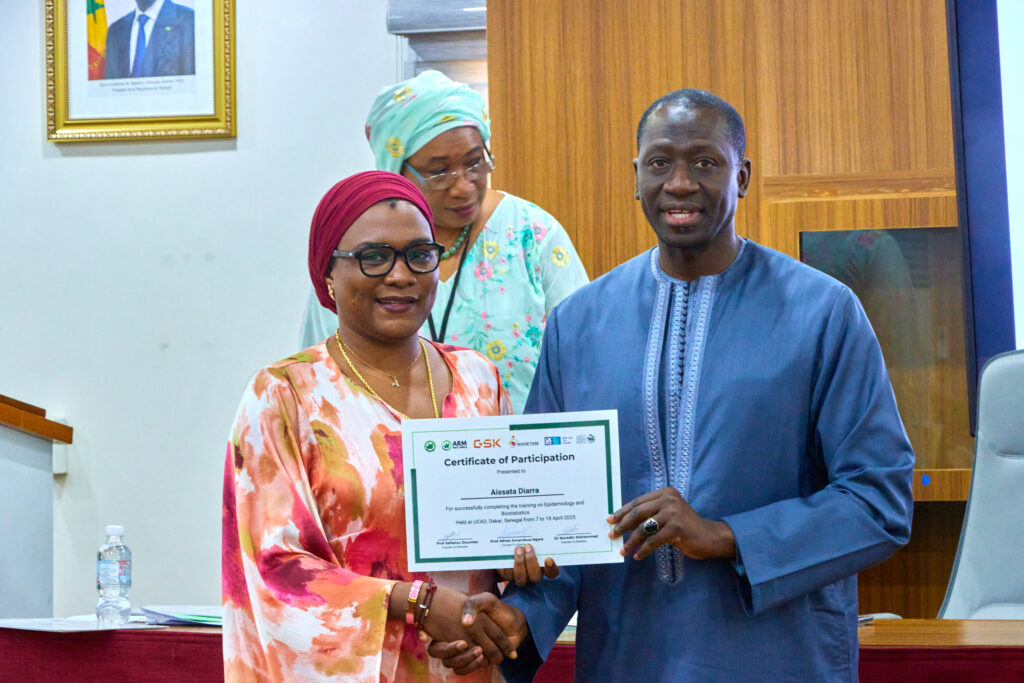The West African Research and Innovation Management Association (WARIMA) concluded a comprehensive two-week training course on epidemiology and biostatistics on 18th April 2025 at CIGASS, Université Cheikh Anta Diop de Dakar, Senegal. The programme, which brought together participants from across West Africa, with particular emphasis on ensuring representation from Francophone and Lusophone countries, forms a core component of WARIMA’s strategic commitment to enhancing research capacity throughout the region.
Professor Safiatou Niare Doumbo, Francophone Vice President of WARIMA and Course Co-Director, highlighted the significance of the training. “This programme is central to our researcher development strategy, which aims to promote PhD and post-doctoral capacity building in West Africa. The enthusiasm we have witnessed from participants underscores the critical need for such specialised training in our region,” she said.
The course was delivered in collaboration with the Medical Research Council Unit The Gambia at the London School of Hygiene & Tropical Medicine (MRCG at LSHTM) and the West African Network for Tuberculosis, AIDS and Malaria (WANETAM). It featured expert facilitation from leading researchers including Professor Alfred Amambua-Ngwa and Dr Nuredin Mohammed from MRCG at LSHTM, who served as Course Co-Directors alongside Professor Doumbo.
Participants received training in essential epidemiological concepts, including measures of effect and impact, various study designs, and critical evaluation of errors, biases and confounding factors. The curriculum also included comprehensive instruction in statistical inference methods and practical sessions using statistical software packages R and Stata, ensuring participants gained hands-on experience with tools essential for modern research analysis. A particularly valuable component was the introduction to genetic epidemiology, bridging traditional methodologies with cutting-edge genomic approaches that are increasingly vital for understanding disease patterns specific to West Africa.
Dr Guétawendé Job Wilfried Nassa from the Institut de Recherche en Sciences de la Santé / Clinical Research Unit of Nanoro (CRUN), Burkina Faso, reflecting on the programme’s impact highlighted that a strong foundation in epidemiology and biostatistics is crucial for designing rigorous studies, analysing complex datasets, and interpreting research findings with confidence, thus, this course is a strategic step towards advancing my career as a research fellow. “The knowledge and skills gained would significantly enhance my ability to conduct independent research, collaborate effectively with multidisciplinary teams, and ultimately, contribute to impactful publications and presentations,” she added.
Speaking at the closing ceremony, Dembo Kanteh, President of WARIMA, emphasised the significance of continuously developing and generating the next cadre of scientists and researchers in West Africa through such training programmes. “This training, which is now our second cohort, represents a vital investment in our region’s research capacity and scientific future,” he noted. “By equipping researchers with advanced skills in epidemiology and biostatistics, we are addressing key factors that have historically inhibited the advancement of science across Africa,” he added.
Mr Kanteh went on to express profound gratitude to GSK for their generous funding of this initiative, which has enabled 31 early and mid-career researchers from across West Africa to gain essential analytical skills that will enhance the quality and impact of health research in the region.
Speaking on behalf of Professor Daouda Ndiaye, founder and Director of CIGASS, Professor Ousmane Ndiaye, General Administrator of CIGASS, congratulated the participants and implored them to become advocates for increased investments in the advancement of science in the region. He further encouraged collaboration among scientists and researchers to ensure the existence of functioning systems and networks that will support generations to come.
The training represents a significant milestone in WARIMA’s ongoing mission to strengthen the research ecosystem in West Africa by developing a cadre of skilled professionals equipped to address the region’s unique health challenges through rigorous, evidence-based research methodologies. Through this training programme and other initiatives, WARIMA remains committed to fostering research excellence across West Africa and looks forward to witnessing the impact of this training through the future work of participants.

